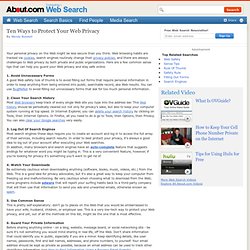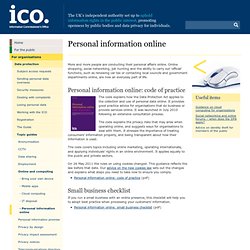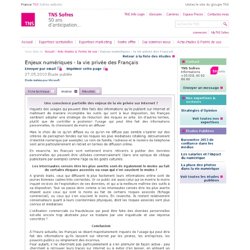

Association familiale Familles de France : : : familles-de-france.org - <b><font size="2">Augmentation des plaintes liées aux données personnelles : la CNIL publie son rapport dactivité 2011</font></b> Web Privacy - Ten Ways to Protect Yourself Online. Your personal privacy on the Web might be less secure than you think.

Web browsing habits are tracked via cookies, search engines routinely change their privacy policies, and there are always challenges to Web privacy by both private and public organizations. Here are a few common sense tips that can help you guard your Web privacy and stay safe online. 1. Avoid Unnecessary Forms A good Web safety rule of thumb is to avoid filling out forms that require personal information in order to keep anything from being entered into public, searchable record, aka Web results. 2. Most Web browsers keep track of every single Web site you type into the address bar. 3. Most search engines these days require you to create an account and log in to access the full array of their services, including search results. In addition, many browsers and search engines have an auto-complete feature that suggests endings for whatever word you might be typing in.
Personal Information Online - Code of Practice. More and more people are conducting their personal affairs online.

Online shopping, social networking, job hunting and the ability to carry out ‘official’ functions, such as renewing car tax or contacting local councils and government departments online, are now an everyday part of life. Personal information online: code of practice The code explains how the Data Protection Act applies to the collection and use of personal data online. It provides good practice advice for organisations that do business or provide services online.
It was launched in July 2010 following an extensive consultation process. The code explains the privacy risks that may arise when operating online, and suggests ways for organisations to deal with them. The code covers topics including online marketing, operating internationally, and applying individuals’ rights in an online environment. On 26 May 2011 the rules on using cookies changed. Personal information online: code of practice (pdf) Small business checklist. Enjeux numériques - la vie privée des Français. Enquête réalisée du 26 au 30 avril 2010 pour par téléphone auprès d’un échantillon national de 1 200 personnes composé de 1000 Français de 18 ans et plus et de 200 Français de 15 – 17 ans.

Chaque catégorie a été remise à son poids réel dans la population afin d’obtenir un échantillon de 1200 personnes représentatif de la population française âgée de 15 ans et plus. Méthode des quotas : sexe, âge, profession du chef de ménage, et stratification par région et catégorie d’agglomération Une conscience partielle des enjeux de la vie privée sur Internet ? Inquiets des usages qui peuvent être faits des informations qu’ils publient sur Internet et maîtrisant de manière incomplète les outils qui sont à leur disposition, les Français semblent adopter une stratégie de réduction des risques ex ante. En d’autres termes, plutôt que de contrôler a posteriori l’usage qui peut être fait des informations personnelles, ils choisissent de moins en diffuser Conclusion.